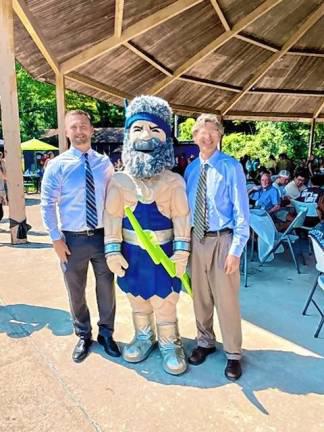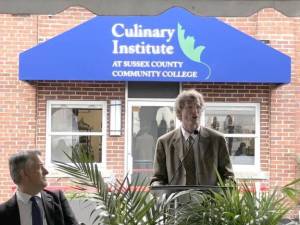SCCC president resigns
NEWTON. College’s board of trustees unanimously votes to make Cory Homer the interim president.



The Sussex County Community College (SCCC) board of trustees accepted the resignation of college president Jon Connolly on Friday afternoon, Jan. 17 and unanimously voted to make Cory Homer the interim president.
“This was a mutually agreed upon resignation and faculty reassignment between the previous president and the board of trustees,” Homer said Saturday morning, Jan. 18.
“My priorities are to improve overall communication and bring stability to the college while leading SCCC forward through the completion of the Optics Technology Center, the migration to a new Enterprise Resource Planning that runs the college, and the accreditation self-study, which is a requirement from our accreditors once every eight years.”
Homer previously was vice president of student success and institutional effectiveness.
While he is interested in pursuing the role of permanent president, that process is up to the board chairman, Kurt Gewecke.
Gewecke did not immediately respond to a request for comment, but a statement from the board said it will establish a search committee at an upcoming meeting.
“The board is confident in the skill and dedication of Dr. Homer to adequately carry the college through this transitional period,” the statement said.
Homer said his salary as interim president likely will be decided in the coming weeks.
The move caps a tumultuous time at the college as several employees, speaking on and off the record, accused Connolly of using intimidation tactics and questionable budgetary practices as president during the past year or so.
He repeatedly denied those allegations.
Last spring, an organizational culture and climate survey of SCCC found that while most employees did not believe there was a hostile work environment on campus, there were concerns about the school’s structural leadership.
The PACE Survey for Community Colleges from North Carolina State University was conducted by Porzio Services.
Granted tenure
In addition to accepting his resignation, the board, on a 7-4 vote awarded Connolly tenure and a full-time position as an associate professor of environmental and biological science, making nearly $83,000 a year. As president, his base salary was $190,000.
Voting no were trustees Matthew Cable, Herbert Yardley, Elizabeth Silverthorne and James Santonastaso. Cable and Santonastaso recently were appointed to the board by Gov. Phil Murphy.
“I am enormously grateful to be back in the classroom serving students and teaching biology and environmental science,” Connolly said in response to questions about his resignation and new role.
Though he will be making considerably less money than he did as president, the board’s move to give Connolly tenure worries some people.
“The board chose to give him immediate tenure, which is unheard of,” said Jason Boehm, an adjunct professor at the college. “Usually, you must go through faculty review, which is a very arduous process. He will be the fifth full-time faculty member in the biology department. Meanwhile, there are departments within the college that have no full-time faculty members.”
Boehm, who is president of the union of adjunct professors, said he discussed the issue with full-time union president Tony Belzano.
Belzano, a professor of anthropology who is away, may reach out to the American Federation of Teachers to see if any action can be taken on Connolly’s tenure because of the unusual way it was granted.
Boehm was quick to add that Connolly is a gifted educator.
“The fact is, Dr. Jon Connolly is a brilliant scientist, an unbelievably passionate and effective educator, and the students of Sussex County are unbelievably privileged to have him as a professor,” he said.
“However, there are people he has traumatized on the campus, and he is not going anywhere.”
A board’s statement said, “The decision to grant Dr. Connolly tenure did not come without significant debate and discussion among board members.
“The board found Dr. Connolly to be sufficiently qualified under the current standards for academic tenure and in fact his resume would suggest he is overqualified for the position he will be holding.”
In addition, the statement said, “The majority decision of the board also reflects the board’s desire to protect the college, and future boards, from a protracted struggle.
“Ultimately, the decision to grant tenure puts to rest any ongoing acrimony regarding the terms negotiated by this board and allows the interim president and future boards to move ahead freely with initiatives that are essential to the success of the institution.”


